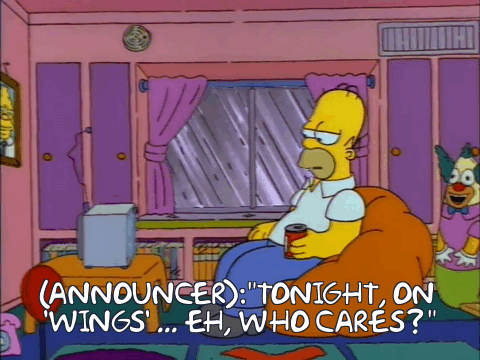



Le XXXIII était sympa mais par contre j’ai été assez déçu par le XXXIV, plutôt poussif à l’image du pastiche de Snowpiercer et du dernier sketch avec Homer. Seul le deuxième segment, avec Lisa en professeure de psychologie criminelle, propose de bons moments…

Vu le Simpson Horror Show 35. Très inégal, comme le précédent. Le pastiche de Pacific Rim était lourdingue, avec un message délivré avec des gros sabots. La parodie de Venom fonctionne sur une idée visuelle assez amusante même si tous les gags ne font pas mouche. Le sketch le plus réussi est le deuxième, avec l’atmosphère macabre de la parodie de la Chute de la Maison Usher d’Edgar Allan Poe, histoire de fantôme très efficace. J’ai également regardé le court diffusé pour le dernier Halloween, énième rencontre les univers Simpson et Disney, et c’était encore une fois très oubliable…
4x14 : Quand Les Simpson se moque de Wings* (à l’occasion d’un plan recyclé du 2x21).

*Réplique changée en VF puisque Wings, à l’instar de Leave it to Beaver, est méconnu en France.
Un ouvrage à venir sur les grandes années de la série :
This comprehensive account of the meteoric rise of The Simpsonscombines incisive pop culture criticism and interviews with the show’s creative team that take readers inside the making of an American phenomenon during its most influential decade, the 1990s.
The Simpsons is an American institution. But its status as an occasionally sharp yet ultimately safe sitcom that’s still going after 36 seasons on the air undercuts its revolutionary origins. The early years of the animated series didn’t just impact Hollywood, they changed popular culture. It wasn’t a watercooler show; it was a show that altered the way we talked around the watercooler, in school hallways, and on the campaign trail, by bridging generations with its comedic sensibility and prescient cultural commentary.
In STUPID TV, BE MORE FUNNY, writer Alan Siegel reveals how the first decade of the show laid the groundwork for the series’ true influence. He explores how the show’s rise from 1990 to 1998 intertwined with the supposedly ascendent post-Cold War America, turning Fox into the juggernaut we know today, simultaneously shaking its head at America’s culture wars while finding itself in the middle of them. By packing the book with anecdotes from icons like Conan O’Brien, George Meyer and Yeardley Smith, Siegel also provides readers with an unparalleled look inside the making of the show.
Through interviews with the show’s legendary staff and whip-smart analysis, Siegel charts how The Simpsons developed its singular sensibility throughout the ‘90s, one that was at once groundbreakingly subversive for a primetime cartoon and shockingly wholesome. The result is a definitive history of The Simpsons’ most essential decade.
ho que ça m’a l’air passionnant ça
La série Les Simpson a été renouvelée pour quatre saisons supplémentaires.